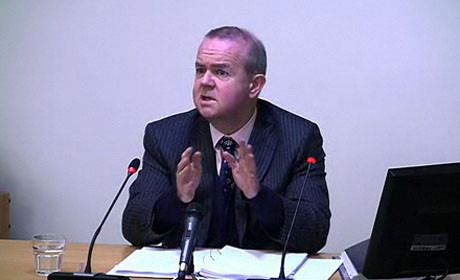
Ian Hislop tells the inquiry the actions of the press which have led to public 'distaste' require enforcement of the law, not a new regulatory code
The editor of Private Eye Ian Hislop today urged the Leveson inquiry to "not throw out the baby with the bathwater" when it comes to making recommendations on the press, adding that he does "not believe" in the regulation of the press, but a free press governed by the law.
In his evidence to the inquiry today Hislop was questioned on why Private Eye is not part of the Press Complaints Commission, to which he responded that the practice outlined by the code "should be self evident" as ethical behaviour.
"I do think that statutory regulation is not required and most of the heinous crimes which made such a splash in this inquiry have already been illegal.
"... All these things don't need a code, we have laws for them."
He called on the inquiry to summon current and past prime ministers David Cameron, Tony Blair and Gordon Brown, "to explain how that comes down from the top".
He added that while it may be "possible to have a better" regulatory system, the actions of the press which have been "so shocking" and "all of these things the public have felt are unacceptable, well it is unacceptable, it's illegal."
"Any inquiry needs to find out why none of these things were enforced", he said.
Downing Street confirmed earlier this month that Cameron would attend the inquiry if asked, after the Times newspaper reported it was "expected" he would be called.
The Private Eye editor did say that he feels "justice should be cheaper and faster" with greater opportunity for "early resolution", but said there are "plenty of ways to speed up justice through courts if you think courts are the right way", adding "you tend to end up in court anyway", in ironic reference to the setting of the Leveson inquiry itself.
Continuing his evidence in relation to the PCC Hislop said he does not think it "has been effective, independent".
"There are plans to change it, Alan Rusbridger has come up with a lot of suggestions. If it changes one would have to reconsider," he said, adding it is "quite embarrassing" that the "only other person not in the PCC is [Richard] Desmond".
"I would not say it's not possible," he said. "It was a decision I took long time ago in order to be separate because I think what Private Eye does is unique."
"I believe in a free press and I don't believe in regulated press ... The press should be kept to account by the law and by the people who buy the papers."
He also spoke against "mandatory involvement", adding "if the state regulates the press then the press no longer regulates the state".
"I don't think you can have mandatory involvement, it becomes difficult. It's like forcing people to apologise or arbitrate."
He added that if you move "into areas where you're dictating what the press can do, it's no longer free."
Later in his evidence Hislop was asked by Lord Leveson if there was anything which "has happened in the course of the inquiry or that has been generated in the last six months that causes you to have any new views or insights you'd like to share as to what should come out of inquiry?"
Hislop responded that after the first two weeks of the inquiry he feared "that might be it for the press", given the "level of distaste from the public".
So he closed saying he "wanted to put in a plea for journalism and the concept of a free press", adding "it is important and not always pretty ... I really hope this inquiry does not throw out the baby with the bathwater."
Free daily newsletter
If you like our news and feature articles, you can sign up to receive our free daily (Mon-Fri) email newsletter (mobile friendly).









